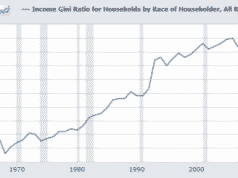Will enough traditions and customs of civility and decency survive long enough to keep the United States from internal disintegration and conquest by Islamic Jihad?
Liberal historian Arthur Schlesinger, Jr., often referred to his father’s theory that political standards follow a thirty-year cycle, first conservative, then liberal, and back to conservative, and so on. There is some truth to that observation, but the problem is that meanwhile the underlying social standards trend downward as a nation becomes more prosperous and life becomes easier. People vaunt their own intellects and come to believe that they no longer need God, that they are sufficient unto themselves for all matters.
After the United States emerged from the fiery furnace of the Civil War, on the road to becoming the most powerful economy in the world, liberal secularists in the 1880s believed that, having shed religion, they were directing us along the path of progress toward social perfection.
Secularists will contend that ridding ourselves of religion has freed us from ignorance and enabled us to make the world according to our own designs. This, of course, is essentially the religious promise of the many varieties of socialist collectivism.
Undeniably we have experienced great changes in social relations since then, the Civil Rights revolution being among the good outcomes (ironically a result of Rev. Martin Luther King, Jr.’s, Bible-based preaching, not secular liberalism). But no one can demonstrate that American society is more civil and decent today than it was in 1929. Nor can anyone argue effectively that the nation is more united now than then.
In the first 330 years of our colonial and national experience, most political leaders and ordinary citizens were intimately familiar with the Bible, as literature and as the source of social standards. Viewing the disintegration of social custom and standards of morality in this country since the late 1960s, they would have feared for our nation’s future. They would have seen the catalog of today’s amorality and immorality (such as sexual promiscuity, marital infidelity, illegitimacy, drug abuse, and abortion) in light of God’s chastising the Jews with the Babylonian captivity for breaking His covenant with Moses by worshiping wealth, power, and man-made gods.
Humans are potentially both the worst and the best of God’s creatures. The keel that keeps the human race from capsizing and sinking altogether is the human soul, the portal to understanding God’s Will. In the Jews’ case, abandoning God led to the destruction of Jerusalem and 70 years of captivity in exile. The fearful question is what’s in store for us?
In that vein, Kartik Ariyur recently emailed the following to me:
Thank you for the posting on the libraries–having never used a public library in the United States, I didn’t realize the magnitude of this problem. Some individuals appear to want to recreate the social habits of ancient Greece, Rome, and Persia–a sure road to ruin.
I have to admit it is difficult to work with individuals who grow up in non-religious families without the inculcation of devotion to God. You never know what they will do next.
While individuals acquire certain habits through the religiosity of their ancestors, and keep society functioning for a while, circumstances soon change, and the new habits the non-religious form are guided by the instincts of self preservation and procreation–an abrupt loss of civilization.
Thus, morality does not appear to survive religion by more than a couple of generations, and with the present pace of change, it won’t survive even one.
But there is another force acting on individuals–as they fail to find in sense pleasures the joy they expected to find, after surfeiting themselves with them; and instead find themselves suffering (Shakspeare–Sonnet 129–The expense of spirit in a waste of shame.all this the world knows well, But none knows well enough To avoid this heaven that leads men to hell).
This is what gets, in my experience many atheists into religion later in their lives. And we may well be on a threshold of another religious transformation of society.
Thomas E. Brewton is a staff writer for the New Media Alliance, Inc. The New Media Alliance is a non-profit (501c3) national coalition of writers, journalists and grass-roots media outlets.
https://thomasbrewton.com/
Email comments to viewfrom1776@thomasbrewton.com





